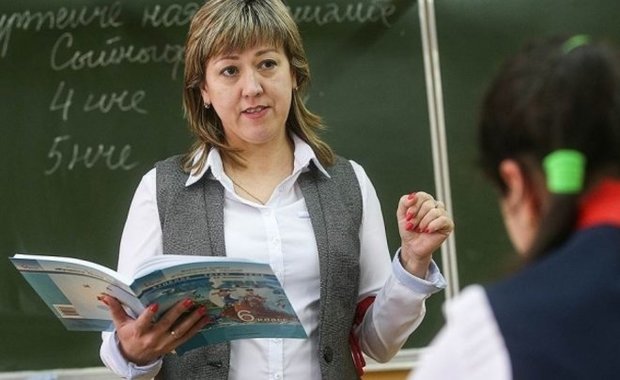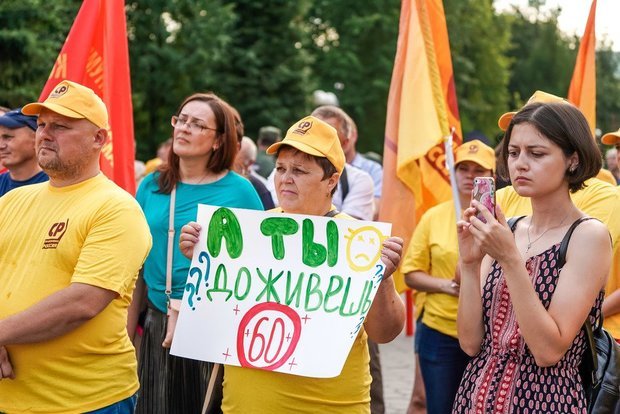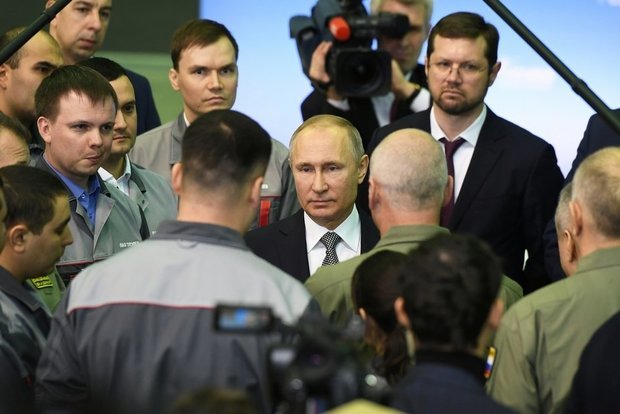Aleksey Malashenko: ''The pension reform in its current version will echo with tremendous force''
About the law on mother tongues, three minority peoples, bad boyars and good tsar
Famous political expert Aleksey Malashenko told Realnoe Vremya why the people that doesn't like the pension reform didn't consider the protests against it important, and why the conservation of a language doesn't depend on school education.
''There are three minority but noticeable peoples in the world''
''Mr Malashenko, you're an expert in Eastern studies. As our Tatarstan and neighbouring Bashkiria bear the mark of the East, so to speak, I will start with a question about the Tatar language or, more precisely, with the law on mother tongue classes at school, which has been adopted these days. How correct is its final version: should a mother tongue be studied in accordance with statements of parents?
I've had an unclear attitude to this law and what happened around it. In general, when I heard about this problem, I began to imagine myself living in Tatarstan or Bashkiria together with my wife or children, I'd, of course, learn Tatar. Why? Because a person living in these republics must know it both psychologically and ethically.
When speaking about compulsory or voluntarily language classes prescribed by law, such a decision is probably to be made not at the top but locally, at the regional level. Why? The United State Exam must be taken in the Russian language, one can do nothing with it. But it's also wrong to ignore the same Tatar language, moreover, Tatarstan is a kind of exception for Russia, as the problem of the Tatar language class is acute here. This is why there simply can't be a general solution to suit everyone. But I fail to understand, where did the problem with the Tatar language arise? As I understand, was there reached a consensus on this issue previously?
Everything came from long-standing complaints of many parents about a big number of hours of the Tatar language at secondary school, which, in their opinion, didn't allow to thoroughly learn the Russian language. Yes, on the one hand, there was a consensus – a regional and federal component was in educational programmes. But Tatarstan dealt with the regional component, while the federal components regarding the number of hours to learn the Russian language wasn't regulated. There were few hours of Russian somewhere, which caused discontent among the parents about compulsory and necessary classes to learn the Tatar language. There wasn't almost paid attention to these complaints, and then President Putin had to interfere. But we should notice the current law was adopted considering the regions' wishes. This is why we can't say only the federal centre dictated the will.
Of course, I'd be against compulsory classes to learn a regional language. But my children would certainly learn it, at least because they live there, because it's a lingua franca, and one must learn a lingua franca. I remember how our Russian people moved to live and work to Baltic states, Middle Asia. In addition, they didn't learn local languages, but it's not pride, it's laziness. There was nothing good about it. The element of laziness remained like we're the superior nation. It's not normal. But what we can do, it's the Soviet legacy we got in the form of irritation of the community's language we lived together with. This is why I wouldn't aggravate the language problem, I'd do my best to let it pass, I'd solve it in the family, at home. But if expanding it, we will get the discontent, which we've already got now.

''Of course, I'd be against compulsory classes to learn a regional language. But my children would certainly learn it, at least because they live there because it's a lingua franca, and one must learn a lingua franca.'' Photo: temakazan.ru
Is the current decision on the language really a compromise?
It is, of course. While it's tough to look for compromises in our life, you know.
Won't a kind of opposition of regional power, what we've seen for almost one year affect Tatarstan President Minnikhanov's position in the Kremlin corridors? Or will the fact that Tatarstan authorities didn't argue with the adopted law and diplomatically asked everyone to calm down play an important role for Minnikhanov?
Power understood love comes as time goes by! And forgive me, but the Tatar language won't disappear! Why? There are three minority but noticeable peoples in the world – the Jews, Armenians and Tatars who survived and conserved culture in this uneasy world, it means they respected and respect their language.
I think the fears that the language will disappear have no foundation. It didn't disappear in the Soviet Union when the positions of the centre in the linguistic education policy were quite abrupt.
I won't say high-sounding words about culture and so on. But I see it's early for the Tatar language to disappear now.
I think a language is, first of all, saved by family. And the majority of Tatar families know how to save it. In this case, can we be really calm about this language?
Of course. There are lofty notions like official language and so on. But there is a language at the level of family, at home and on the landing. At the same time, how can one live with a Russian, Tatar, Bashkir, French on one landing without any close communication? It's impossible without communication. And here the most important thing is not to aggravate and not to deal with cheap nationalism from both the Russian and Tatar side.
''The pension reform in its current version is, of course, a terrible problem''
But normal people, ordinary people don't deal with nationalism. And if such a disease affects them, it happens only via unwise political animals, to put it mildly. Do you agree?
I agree, my daughter is married to a Tatar man, and we celebrate all national holidays altogether, and one of the granddaughters is half Ukrainian, and there is no national problem here.
As for politicians, language is a very comfortable tool for national, cultural and religious positioning to show like I'm the protector of my mother tongue. Sadly, this is true, and it will be so. And it's not even a disease but a trend that we, unfortunately, won't get away from. As humans, we should treat such politicians in a calm and unaggressive way.
Let's switch from the linguistic topic to social. The key topic of the summer is the pension reform. Citizens staged protests against the ideas offered by functionaries last weekend. People are afraid they won't find a job, they are afraid of long poor existence with such ideas. And they can be understood. But there have been few people, while the reform is disapproved by everyone (what social surveys show)! Why?
As I'm a professional historian, I'd look deeper here and say we've seen our political culture. The pension reform in its current version is, of course, a terrible problem, and it will echo with tremendous force, while it turns out we don't care like in a popular song! People think nothing depends on them, and if something has already been decided in the Kremlin and the Duma, what can we do? People think we have a good tsar and bad boyars and at least we will complain to the tsar, moreover, the ''tsar'' said he was sceptical about this reform. It's a typical example of old Russian and even new Russian political culture – ''nothing depends on us!'' And this example is a catastrophe because if such a behaviour goes on, power will be brazen about the citizens. The pension reform is already a robbery. And if you think Putin doesn't understand it, you're mistaken. He perfectly understands it and knows its adoption can affect him too. But the people didn't go to protest, which means power is given carte blanche for everything they will do.

''The pension reform in its current version is, of course, a terrible problem, and it will echo with tremendous force, while it turns out we don't care like in a popular song!'' Photo: Dmitry Reznov
I'm inclined to think our people will be active only when it receives an astronomical utility bill or when children or grandchildren of our citizens are in some ecological danger, the same passivity like now will go on in other issues. Do you agree?
It's worse than passivity. But you understand that people haven't had a painful injection in the last year – prices haven't risen, inflation hasn't gone up, they've been rather dragged because we have oil, gas and all misfortunes can be mixed. There is no injection, blow after which people would go to protest! Imagine if the prices that had been growing for five years has risen in a day. In this case, activity in public squares would be higher. As for ecology and children, people actually know nothing about ecology because they weren't taught, they weren't told the ecological environment could be dangerous. Our people can only shout: 'Let's save forests!', while there is no money and desire to save forests. What will happen if there is a fire here, near Moscow where many have a rest? Nothing.
Look how Russian identity is interpreted now. It's patience! ''Let's be patient!'' says the Patriarch. It was also said previously about patience, temporary difficulties, but, forgive me, we've been having temporary difficulties since 1917. And if there was at least socialism in the past, what's happening now? Yes, we're a patient people. But it turns out we are taught to be patient! What for are we urged to be patient and to suffer?
''Putin really wants to be a good tsar''
If power will carry out some reforms for better life with urges to patience, and if they bear fruits, people will understand why patience is needed…
The case is that we've been living in this political culture for a very long time, probably since the era of Batu Khan or maybe Vladimir the Great. Peter the Great, Catherine the Great, Alexander II, Lenin and Gorbachyov tried to break this culture. But we anyway went back to the ''Father the Tsar whom we will pray for, and he will do everything for us''.
You're saying a ''blow'' is needed for the people to understand problems. When was the last ''blow''?
In Gorbachyov's late ruling, when hunger was felt. People saw how they lived, they watched Govorukhin's film We Can't Live Like This, started to compare and ask themselves: ''Where are we living?'' And it was the quantity that turned into quality. But then inertia began, and all the ''quality'' came to an end, in the end, then Putin came. A foreign enemy turned out to be the main thing in Russia's politics, while we will withstand all other difficulties to consolidate around power, and power is a great tsar. We've had it but we had it every fifty years and will probably have despite the reforms that will certainly come ahead. This is all pessimistic, but it's our history.
Why does it happen so? We see a people with a sluggish political culture, whatever can be imposed, including the current pension reform, and Putin already starts to play a good tsar. What's the problem here?
You're absolutely right – Putin really wants to be a good tsar, and he is for the people. In addition, he is informed, explained his rating has fallen, the rating in publications has also seriously fallen, but Putin's rating has fallen, not that of Medvedev! Secondly, I allow anyway that he thinks of the people as a head of the country. Anyway, he must certainly think of it because he gets money for it. And if someone explained him or he got it himself that the reform would be bad for the president only, Putin started thinking. Yes, the people likes all this greatness, this ''fight'' against the USA. But now it turns out Putin is responsible for the disorder inside, including the pension reform, but he doesn't want. And it seems he kept at a distance from it, in any case, he is at a distance from the way it was laid out, while it's very uneasy. But Putin felt the responsibility – the responsibility he assumes not only for ''Crimea is ours!'' but also for something bad, while it is even very good.

''Yes, the people likes all this greatness, this 'fight' against the USA. But now it turns out Putin is responsible for the disorder inside.'' Photo: kremlin.ru
But, Mr Malashenko, you know, it's very difficult to get rid of what we see as the application of the scenario of our power – the government was prepared the role of the baddy, while Putin is a rescuer…
You're absolutely right that it was prepared. But if we talk about theatre, we should note spectators also sometimes interfere in the action of a play in the theatre. People, the ''spectators'' are irritated by the pension reform. And the rating that has fallen is an impact of the spectators. And the ''actors'' have felt the audience doesn't accept them. And if it isn't accepting the pension reform today, what won't the spectator accept tomorrow?
In addition, all our power is incredibly coward because it does what isn't needed for the country and society. It perfectly understands what a corruption level we have in Russia, but it's afraid of everything in this respect – from Navalny to Pussy Riot! It's afraid because it understands if there were another political culture, there would be another people, and someone would come and ask it a question: ''Guys, what are you at? You have offshore money and so on, but what do you give us?'' And it's pathologically afraid of such questions. And fear is a sign of its weakness, and, unfortunately, nothing comes next. This is the situation – the politically lazy people and coward power that tries to suppress the protest by all means.
To be continued